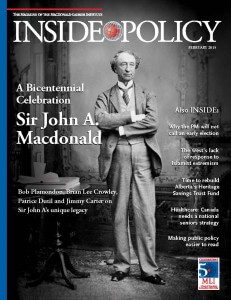In the Feb. 2015 edition of Inside Policy, the magazine of the Macdonald-Laurier Institute,  Macdonald-Laurier Institute Managing Director “interviews” Sir John A. Macdonald using quotes from his famous speeches and other recorded remarks.
Macdonald-Laurier Institute Managing Director “interviews” Sir John A. Macdonald using quotes from his famous speeches and other recorded remarks.
By Brian Lee Crowley, Feb. 12, 2015
Brian Lee Crowley:
It is an honour and a privilege to welcome back today Sir John A. Macdonald, the “Man who made Canada”. We’re all very grateful to you for that of course. But it must strike you that, well, the place has had more than its share of troubles.
Sir John A. Macdonald:
“Do you expect to go through life without troubles? If you do, you have been deceived. Troubles come as naturally to man as sparks fly upward from a fire.”
BLC:
Fair enough. But in your day the Americans and French had a lot to say about newfangled notions like abstract rights of people as a way to solve our troubles. What made you think the ancient British system was superior?
Macdonald:
“In all countries the rights of the majority take care of themselves, but it is only in countries like England, enjoying constitutional liberty, and safe from the tyranny of a single despot, or of an unbridled democracy, that the rights of minorities are regarded.
BLC:
You are obviously proud of your British heritage.
Macdonald:
“A British subject I was born, a British subject I will die.”
BLC:
But what about Canada?
Macdonald:
“For a century and a half, this country has grown and flourished under the aegis of the British Crown. We enjoy the blessings of civilization, forming one of the most law-abiding peoples…. Under broad folds of the Union Jack and of the Crown, we enjoy the most ample liberty to govern ourselves as we please. … Let us be proud and show ourselves worthy of this centuries-old tradition.”
BLC:
This talk of Britain and the Empire is all fine and good for white Anglo-Saxon males. But what about ethnic and cultural minorities? Starting with Quebeckers?
Macdonald:
“We have a constitution now under which all British subjects are in a position of absolute equality, having equal rights of every kind — of language, of religion, of property and of person. There is no paramount race in this country; we are all British subjects, and those who are not English are nonetheless British subjects on that account.”
BLC:
You were always a bigger fan of Britain than the United States. How do you feel about a Conservative Prime Minister a century or so after your time negotiating free trade with the Americans, when you are famous for your protectionist National Policy?
Macdonald:
“A National Policy … will prevent Canada from being made a sacrifice market … and … will greatly tend to procure for this country, eventually reciprocity of trade … It is only by closing our doors and by cutting them out of our market, that they will open theirs to us …”
BLC:
I guess you know that in the years since your last electoral victory, Canada has become a much more modern place. Why, in the 1940s your own party even renamed itself the Progressive Conservatives.
Macdonald:
“Anyone desirous of being a progressive conservative should follow me.”
BLC:
Wow. I’ll bet not many people know that you said that in 1855. Yet people say you were no visionary, just an opportunist who happened to make a nation along the way.
Macdonald:
“I am satisfied to confine myself to practical things – to the securing of such practical measures as the country really wants. I am satisfied not to have a reputation for indulging in imaginary schemes and harbouring visionary ideas.”
BLC:
Well, one practical thing you managed, that we’re still struggling with today, is making Quebec a vital part of your project to build a Canadian nation.
Macdonald:
“No man in his senses can suppose that this country can, for a century to come, be governed by a totally unfrenchified Government. … Treat them as a nation and they will act as a free people usually do – generously. Call them a faction and they become factious.’”
BLC:
It’s nice to have friends. But weren’t some people uneasy about the way you used the powers and perks of government to, uh, reward loyalty?
Macdonald:
“I think that in the distribution of governmental patronage we carry out the true constitutional principle. Whenever an office is vacant it belongs to the party supporting the Government; if within that party there is to be found a person competent to perform it. Responsible Government cannot be carried on by any other principle.”
BLC:
Didn’t that sometimes result in a cabinet full of hacks?
Macdonald:
“Give me better wood and I will make you a better cabinet.”
BLC:
That sort of attitude got you branded an opportunist. Why, the opposition once even accused you of stealing their brains.
Macdonald:
“I have been accused of many offenses in my life time, but this is the first time I have ever been charged with petty larceny.”
Brian Lee Crowley is managing director of the Macdonald-Laurier Institute.




